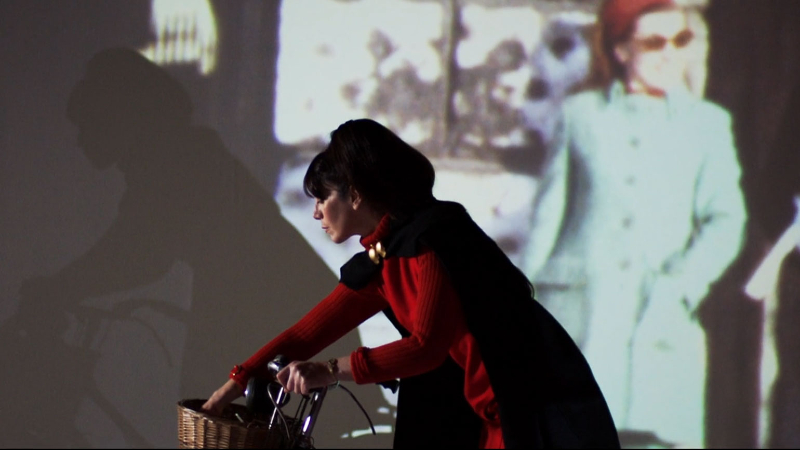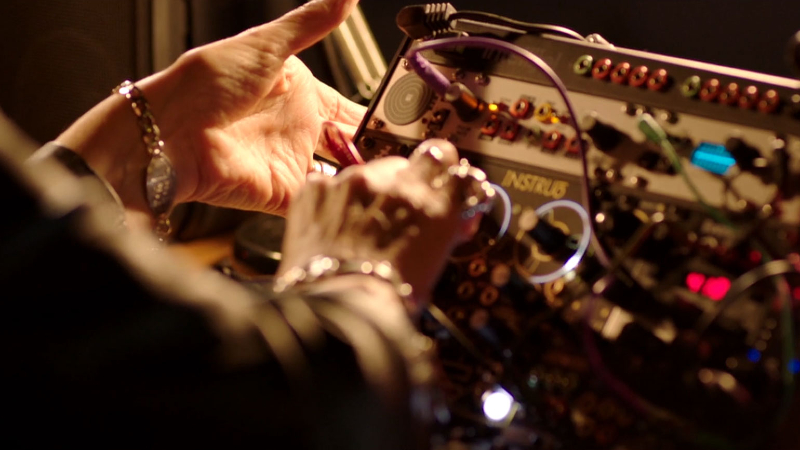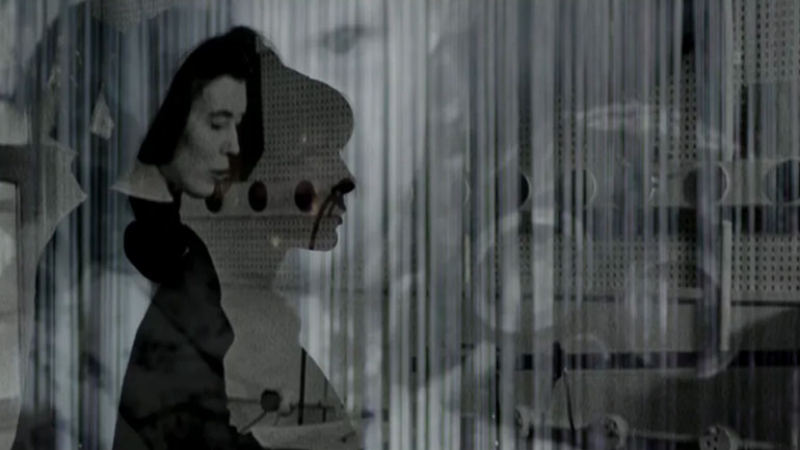Director – Caroline Catz – 2020 – UK – 98m
*****
Docudrama explores the ten years the legendary electronic musician spent at the BBC Radiophonic Workshop – on BBC iPlayer from Sunday, May 16th for a year
Part documentary, part drama and part performance art, this is a fascinating examination of Delia Derbyshire, the woman who between 1962 and 1973 worked in the BBC Radiophonic Workshop. The film does examine her life and career before and after that, but only briefly. After studying mathematics and music at Cambridge, she became interested in music as an expression of mathematics and, as such, knew that the Radiophonic Workshop was the place she wanted to be.
We see Delia (writer-director Caroline Katz) interviewed for a job at Decca Records only to be told that women don’t work in the technical department but there are openings for secretaries. It’s easy to see that as sexism now, but at that time such attitudes were commonplace. She wonders if her interviewer was the person who turned down the Beatles. We see interviewed Dutch video artist Madelon Hoodykas with whom she collaborated in The Netherlands after her BBC period and there’s some brief footage of the LYC museum set up by Li Yuan-chia near Hadrian’s Wall where she spent some time after a disastrous marriage to a man with whom she had little in common with beyond drinking.

There’s a frame story of sorts involving performance artist and musician Cosey Fanni Tutti exploring Delia’s tapes. There are bizarre sequences where Katz as Derbyshire does such things as ride a bicycle past a projector screen playing visual images. And there are bits and pieces of Delia Derbyshire archive footage alongside which footage of Katz as Derbyshire is seamlessly edited.
Further interview material covers people who knew her in the BBC years. Peter Zinovieff ran his own sound studio in Putney which became a refuge for Derbyshire and Radiophonic Workshoppers when they wanted to do some non-BBC work. Brian Hodgson saw the Unit Delta Plus concert in Newbury (which came about because Peter knew the people who owned the theatre) and immediately wanted to work with Derbyshire. David Vorhaus went to lecture by Unit Delta Plus and was similarly smitten. Again, these people are also portrayed by actors in the drama segments which are in turn seamlessly integrated into the whole.
Like the Decca interview, the film is awash with a riot of fascinating incidental detail about sound studios and equipment, the prevailing attitudes of the day and more. In real life, once Derbyshire got into the BBC it took her some two years to get transferred to the Workshop. In the film, it appears to happen in seconds. Amusingly, the Corporation considers the tiny department like a punishment, a place to which no-one would willingly wish to go and in which people would probably last no more than two or three months before the psychological effect as of the sound would drive them mad. The personnel manager to whom she talks seems rather incredulous that anyone would actually want to work there.

And then there’s the equipment, the working methodology and the music. The workshop turns out to have not so much the latest in equipment but a collection of often antique oddities. We watch in amazement as magnetic recording tape loops wind round a series of bottles in the studio. And we marvel at the sound textures Derbyshire created. The scene where she first taps out a rhythm in accordance with Ron Grainer’s instructions and then sets the tape reels going producing the familiar sound of the Dr.Who theme music is heart-stopping, but there are other, equally impressive sound textures such as the one she creates to accompany footage of camels crossing the desert sands.
Inevitably, as it progresses the film traverses the sixties’ idea of free relationships in which no-one owns anybody else and touches on Derbyshire’s alcoholism, but these areas are wisely never allowed to usurp the wider themes of art and artistry, technology and musicianship. The Workshop technicians are not allowed to make music (although that’s clearly what they’re actually doing) and the ‘M-word’ is banned from discussions on the premises.
Nevertheless, this strange little corner of the Corporation, like a forgotten broom cupboard, was to prove the perfect playground for the woman today considered by many the mother of electronic dance music. When, towards the end, we hear the recording of Derbyshire’s 1971 recording Dance from Noah, you would swear you were listening to a contemporary dance music track.
With its totally integrated use of very different film forms, this remarkable and beautifully crafted movie stands as a hugely appropriate testimony to one of the great, unsung pioneers of electronica. Highly recommended for Derbyshire connoisseur and newcomer alike.
Delia Derbyshire: The Myths and Legendary Tapes is on BBC iPlayer from Sunday, May 16th for a year.
Trailer:
Festivals
2020
On BFI Player as part of the BFI London Film Festival 2020 from 8.30 Thursday, October 15th to 18.30 Sunday, October 18th.
